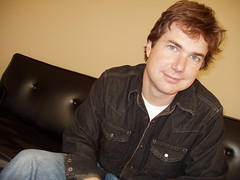
Here's an interesting quote I happened on in this week's issue of HopeDance, a free newspaper in San Luis Obispo County with a fairly sizable distribution. It's an excerpt from a book by John Lamb Lash called
Not in His Image: Gnostic Vision, Sacred Ecology, and the Future of Belief:
If the human species is to survive in the near future, it will have to live in Gaia's way, not in the demented, self-centered willfulness to which we are accustomed. But what do we know, so far, of Gaia's way? With the eradication of the Mysteries, humanity lost the most important spiritual resources of the Western world...The process that began six thousand years ago, perhaps triggered by a vast climatic catastrophe in North Africa and the Near East, led to monotheistic religion with its suppression of the Goddess, and then, through the transference effectuated by Saint Paul, to the triumph of salvationism as the spiritual paradigm of the Western world...There is no more powerful ideology for oppression than redemptive religion.I realize this is a fairly standard New Age analysis of how Christianity ruined Western culture, but what I appreciate about it (believe it or not) is its attack on the actual doctrine of Paul and Christianity, rather than just a vague stab at cultural Christendom, which has always been somewhat at odds with genuine biblical Christianity. Lash says that Christianity's focus on redemption and salvation makes it a dangerous religion that will ruin the world. Here, though, is the mistake in this accusation: Paul's religion was that the kingdom of Jesus Christ would bring in the restoration of the whole cosmos, not just human souls. In other words, Paul's doctrine of redemption included the redemption of the world, the freeing of even nature from oppression. In Romans 8:19ff. Paul says, "For the creation waits with eager longing for the revealing of the sons of God. For the creation was subjected to futility, not willingly, but because of him who subjected it, in hope that the creation itself will be set free from its bondage to decay and obtain the freedom of the glory of the children of God. For we know that the whole creation has been groaning together in the pains of childbirth until now. And not only the creation, but we ourselves..."
Notice how the inanimate creation experiences its renewal alongside of those persons who also will be renewed by Christ -- their salvation becomes the cosmos' salvation. Paul's Christianity, therefore, has an extremely exalted view of the environment and its future, and those who follow Paul will not be haphazard in causing decay in very same world that God has said he wants to one day fully restore. Christian doctrine doesn't take the Gaia route to its positive view of the environment, but it gets there nonetheless. Of course, Christendom (the society of historical Western culture that has presumably based itself on the Bible) has not always lived consistently with these biblical values. But its worst blemishes arose when it abandoned Paul and redemptive religion, not because it followed it. Neither is Paul's teaching a fully formed environmentalism in a modern sense -- but it's still fair to say that texts like Romans 8 lean in the environmentally-conscious direction rather than away from it.
And here's the real kicker: if Paul's emphases on the created world were forgotten at times by Western Christendom, it was due to the ongoing influence of Platonic and Gnostic philosophy. While Gnosticism is diverse, most versions taught that the physical world was the vile creation of the evil Demiurge who was trying to distract humanity from the real God-beyond-creation. Those under the influece of such a system of doctrine, even when otherwise informed by the Bible, were more likely describe salvation in terms of jettisoning the physical body and this worthless world, and to get on to the ethereal heavenlies. While such ideas clearly have a home in Gnosticism, they would not have occurred to Paul or the writers of the New Testament who believed that God had made human flesh and the physical universe, and would one day restore both when Christ returns. So, one of the most natural religious foundations for a positive view of the environment turns out to be Pauline Christianity -- a redemptive, salvific religion, yes, but one that can conceive of the final location of that salvation in other New Testament terms as a "New Heavens and a New Earth."



